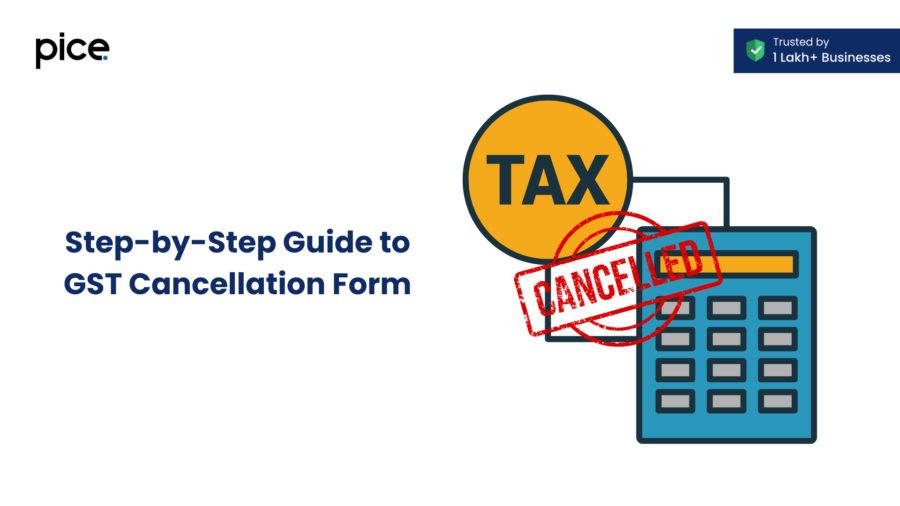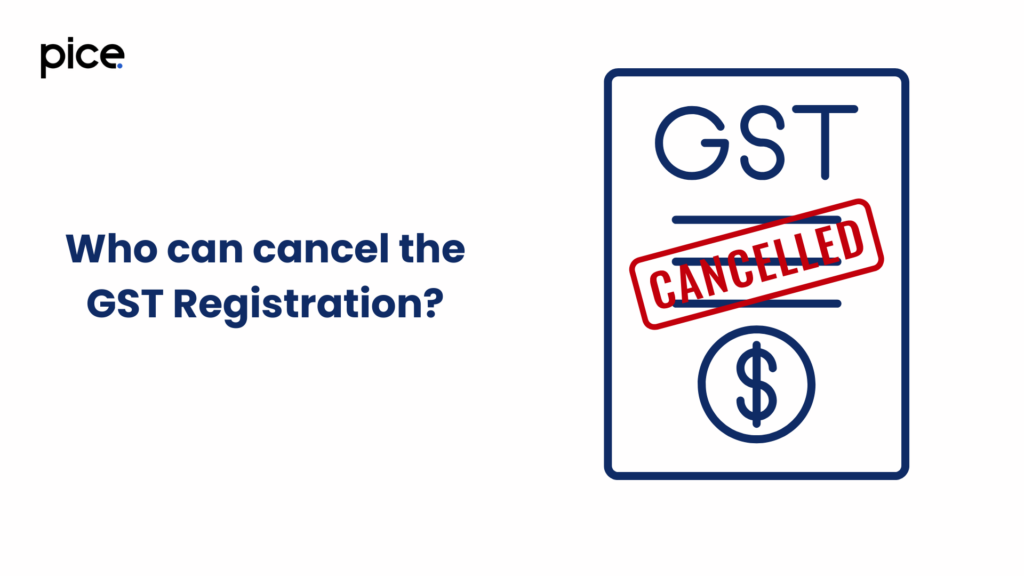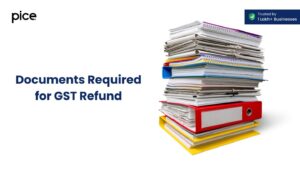Step-by-Step Guide to GST Cancellation Form
- 29 Aug 24
- 12 mins

Step-by-Step Guide to GST Cancellation Form
Key Takeaways
- Taxpayer-Initiated Cancellation: Apply using FORM GST REG-16 for reasons like business discontinuation or turnover falling below the threshold.
- Officer-Initiated Cancellation: Officers can cancel for non-filing of returns, fraud, or false information, using FORM GST REG-17.
- Revocation: Apply for revocation within 30 days by rectifying issues and using FORM GST REG-21.
- Re-Registration: Businesses can re-register if turnover exceeds the threshold or taxable activities resume, using FORM GST REG-01.
- Compliance: Ensure all dues are cleared, returns filed, and records maintained to avoid issues post-cancellation.
A cancellation of GST registration signifies that the taxpayer is no longer recognized as a registered person under the Goods and Services Tax (GST) regime. This results in the cessation of GST-related obligations, including the collection and remittance of GST, as well as the inability to claim Input Tax Credit (ITC).
Who can cancel the GST Registration?

Different entities can cancel their GST registration in various situations by using particular forms and adhering to the correct procedures. Here's a detailed explanation with relevant keywords:
Taxpayer-Initiated Cancellation
1. Application for Cancellation by Taxpayer:
A taxpayer can apply for cancellation of GST registration if they wish to discontinue their business or no longer meet the registration criteria. The application for cancellation is made using FORM GST REG-16. This form must be filed within a specified time limit from the date of the event warranting cancellation.
2. Transfer of Business:
If the taxpayer is transferring their business, either fully or partially, the GST registration can be canceled. The new owner must then apply for fresh registration. This includes scenarios such as the amalgamation of business or any other legal succession.
Officer-Initiated Cancellation
3. Cancellation by Tax Officials:
A GST officer can cancel the registration if the taxpayer violates GST laws, fails to file GST returns, or engages in fraudulent activities. The officer issues a notice in FORM GST REG-17 to the taxpayer, asking for an explanation as to why their registration should not be canceled. The taxpayer must respond within the stipulated time frame.
4. Reasons for Cancellation by GST Officer:
Common reasons include non-filing of GST returns, providing false information during registration, or any other significant non-compliance with business compliances under the GST regime.
Cancellation by Legal Heirs
5. Legal Heirs:
In the event of the death of a registered person, the legal heirs can apply for the cancellation of GST registration. They must provide relevant documents and fulfill necessary business compliance requirements to complete the process.
Time Limit
Applications for cancellation must be filed within a specified time limit as per GST rules to ensure compliance and avoid penalties.
Cancellation of GSTIN for Migrated Taxpayers
Migrated taxpayers, those automatically registered under GST from the previous tax regime, may opt for cancellation if they are no longer eligible or if their turnover falls below the prescribed limit. They must file an application in FORM GST REG-16 for this purpose.
Why Does a Taxpayer Wish to Cancel His Registration?
A taxpayer may wish to cancel their GST registration for several reasons:
1. Discontinuation of Business:
Migrated taxpayers may apply for cancellation of registration if they discontinue their business. The application for cancellation must be filed using FORM GST REG-16 within a specified time limit.
2. Voluntary Cancellation:
Taxpayers who no longer meet the criteria for mandatory registration can opt for voluntary cancellation. This includes cases where their aggregate turnover falls below the prescribed threshold limit for taxable persons.
3. Transfer of Business:
If the business is transferred due to sale, merger, demerger, or amalgamation, the taxpayer can apply for cancellation. The new entity must obtain a fresh registration. Relevant documentation, such as the amalgamation of business, should be provided.
4. Violation of GST Laws:
The concerned tax authorities can initiate cancellation if the taxpayer violates GST laws. Common reasons include non-filing of tax returns, fraudulent activities, or providing false information during registration. The process begins with a notice in FORM GST REG-17.
Forms for Cancellation
To cancel GST registration, the taxpayer must use specific forms, depending on their situation:
- GST REG-16 FORM: Application for cancellation of registration.
- GST REG-17 FORM: Show cause notice for cancellation.
- GST REG-18 FORM : For replying to the show-cause notice.
- GST REG-19 FORM : Order for cancellation of registration.
- GST REG-21 FORM : For application of revocation of cancellation.
- GSTR-10 FORM: Final return to be filed by the taxpayer.
Steps for GST Registration Cancellation
Step 1: Filing Application for Cancellation:
The taxpayer or legal heir must file an application for cancellation using FORM GST REG-16 and provide reasons for cancellation, including the date from which cancellation is sought.
Step 2: Processing by Tax Officer:
The tax officer reviews the application and, if satisfied, issues an order for cancellation using FORM GST REG-19. If there are discrepancies or additional information needed, the officer may issue a notice in FORM GST REG-17.
Step 3: Final Order of Cancellation:
Upon completion of the process, the final order of cancellation is issued. The taxpayer must ensure that all tax returns and liabilities are cleared before the cancellation is finalized.
Why will the officer cancel registration?
An officer may cancel a taxpayer's GST registration for several critical reasons, focusing on compliance and adherence to GST laws. Here are the detailed reasons:
1. Non-Compliance
Repeated Failure to File Returns:
One of the primary reasons for cancellation is the taxpayer's repeated failure to file GST returns. This includes non-filing of GSTR-3B, GSTR-1, and annual returns. Non-compliance in timely submission of these returns can lead to cancellation proceedings initiated by the GST officer.
Non-Payment of Tax:
Failure to pay due taxes within the stipulated time frame also results in non-compliance. Continuous default in tax payment obligations leads the officer to initiate cancellation under the non-compliance category.
2. Fraudulent Activities
Issuing Fake Invoices:
Involvement in issuing fake invoices for the purpose of claiming input tax credit (ITC) or tax evasion is a serious offense. The GST officer can cancel the registration if the taxpayer is found engaging in such fraudulent activities. This includes manipulating invoice details to increase ITC claims or reduce tax liability.
Other Fraudulent Activities:
Any other activities that indicate fraud, such as misstating business operations or hiding taxable supplies, can lead to the cancellation of registration. The officer monitors these activities to ensure compliance with GST laws and regulations.
3. Discontinued Business
Cessation of Operations:
If the business has ceased operations and is no longer conducting any taxable activities, the officer can cancel the registration. This applies to cases where the business has been shut down or has become dormant.
Ineligibility for Registration:
If the business no longer meets the eligibility criteria for GST registration, such as falling below the turnover threshold, the officer may cancel the registration. The taxpayer must notify the tax authorities of such changes.
4. Other Violations
Breach of GST Laws and Regulations:
Any breach of GST laws and regulations that does not fall under the aforementioned categories can still lead to cancellation. This includes non-compliance with business compliances, incorrect filing of returns, or not maintaining proper records.
Non-Compliance with Notices:
Failure to respond to notices issued by tax authorities, such as those in FORM GST REG-17, can also result in cancellation. The taxpayer is required to address any issues raised by the tax authorities promptly.
What is Revocation of Cancellation?

Revocation of cancellation refers to the process of reinstating a canceled GST registration. This is applicable when the registration has been canceled by the tax authorities but the taxpayer believes that the cancellation was incorrect or unjustified.
When is Revocation of Cancellation Applicable?
Revocation of GST registration cancellation is a process that allows a taxpayer to restore their canceled GST registration under certain conditions. Here are the detailed scenarios elaborated with relevant keywords:
Conditions for Revocation
1. Application Within 30 Days: The taxpayer must apply for the revocation of cancellation within 30 days from the date of the cancellation order. This application is submitted through the common portal or unified portal using FORM GST REG-21.
2. Rectification of Default or Non-Compliance: The taxpayer must rectify the default or non-compliance that led to the cancellation. This could involve:
- Filing pending GST returns: Ensuring all GSTR-3B, GSTR-1, and other required returns are filed.
- Payment of tax dues: Settling any outstanding tax liabilities, including interest and penalties.
3. Satisfactory Reasons for Revocation: The proper officer must be satisfied with the reasons provided for the revocation of cancellation. The taxpayer needs to submit a detailed explanation justifying the reasons for the delay or default and demonstrating compliance with GST laws.
Process for Revocation
1. Filing the Application: The taxpayer files FORM GST REG-21 for revocation of the cancellation order. This application must include all relevant details and supporting documents to prove rectification of defaults.
2. Review by Tax Officer: The proper officer reviews the application. If the application is in order and the officer is satisfied with the taxpayer's compliance, the revocation is processed. The officer may issue a notice in FORM GST REG-23 if additional information is required.
3. Issuance of Revocation Order: Upon satisfactory review, the officer issues an order for revocation of cancellation using FORM GST REG-22. This order reinstates the taxpayer's GST registration, allowing them to resume their taxable activities.
Key Forms and Sources
- FORM GST REG-21: Application for revocation of cancellation.
- FORM GST REG-22: Order for revocation of cancellation.
- FORM GST REG-23: Notice for seeking additional information.
Can the Business Register for GST After Cancellation?
Yes, a business can register for GST again after cancellation if it becomes eligible in the future. This may occur if its turnover exceeds the threshold limit once more or if it resumes business activities that require GST registration. Here are the details elaborated with relevant keywords:
Eligibility for Re-Registration
1. Exceeding Turnover Threshold: A business that has previously had its GST registration canceled can re-register if its annual turnover once again exceeds the threshold limit for mandatory registration. The current threshold limits are defined based on the type of business and the nature of supplies.
2. Resumption of Business Activities: If a business that had ceased operations resumes its taxable activities, it must apply for GST registration. This includes situations where the business starts supplying taxable goods or services again.
Re-Registration Process
1. Application Submission: The business must submit a new application for GST registration through the common portal or unified portal. The application is made using FORM GST REG-01. This form requires the business to provide details such as its taxable person status, nature of business, and turnover.
2. Verification by Tax Authorities: The application is reviewed by the concerned tax authorities. They verify the details provided and may conduct additional checks to ensure compliance with GST laws. The tax authorities also ensure that any previous non-compliance issues have been resolved.
3. Issuance of GSTIN: Upon successful verification, the business is issued a new GST Identification Number (GSTIN). This allows the business to operate legally under the GST regime, issue tax invoices, and claim input tax credit (ITC) on purchases.
Relevant Forms and Documentation
- FORM GST REG-01: Application for new registration.
- FORM GST REG-02: Acknowledgment issued on receipt of the application.
- FORM GST REG-06: Certificate of registration issued upon approval.
Compliance Requirements
1. Filing of Returns: The business must comply with all GST return filing requirements, including GSTR-3B, GSTR-1, and annual returns. Ensuring timely and accurate filing is essential to maintain the new registration.
2. Payment of Dues: All outstanding dues, including past liabilities, must be cleared. This may involve paying any pending taxes, interest, or penalties that were due at the time of the previous cancellation.
3. Business Compliances: The business must adhere to all GST regulations and compliance requirements, including maintaining proper records, issuing accurate e-way bills for the movement of goods, and reconciling vendor payments.
Benefits of Re-Registration
- Legitimate Operations: Enables the business to operate legally within the GST framework.
- ITC Claims: Allows the business to claim input tax credits on purchases, reducing overall tax liability.
- Market Credibility: Enhances credibility with customers and suppliers by ensuring compliance with tax laws.
Conclusion
Cancellation of GST registration is a significant step that involves specific procedural requirements. Understanding the reasons, forms, and implications of cancellation is crucial for compliance and effective tax management. Proper handling of the cancellation process ensures that businesses do not face legal or financial issues post-cancellation. Always refer to the official GST portal for the latest updates and consult with tax professionals for guidance tailored to your specific situation.
💡 If you want to pay your GST with Credit Card, then download Pice Business Payment App. Pice is the one stop app for all paying all your business expenses.
 By
By 
















